
A Cross Ocean Experience
Seven thousand miles of outstanding cruising since November 2008 means it's time to do a little renovation and more planning for the future. Find out what ...
20 February 2013 | Fishtail, Montana, USA
26 May 2012
15 March 2011 | Swallow Falls State Park, Garrett County, MD
07 January 2011 | Deep Creek, MD
01 January 2011 | Tacoma, WA
28 December 2010
17 December 2010 | Sierra Madre, CA
12 December 2010 | Leucadia, CA
12 December 2010 | Leucadia, Ca
12 December 2010 | Ramona, CA
06 December 2010 | Ramona, CA
06 December 2010 | Ramona, CA
20 November 2010 | New Orleans, LA
13 November 2010 | Lexington, KY
09 November 2010 | Louiville, KY
05 November 2010 | Lexington. KY
01 November 2010 | Deltaville, VA
29 October 2010 | Deltaville, VA
22 October 2010 | Deltaville, VA
08 October 2010 | Deltaville, VA
Goodbye ode (Pt. 1 .. a bit long!)
05 May 2009 | Puerto Chiapas, MX
RC
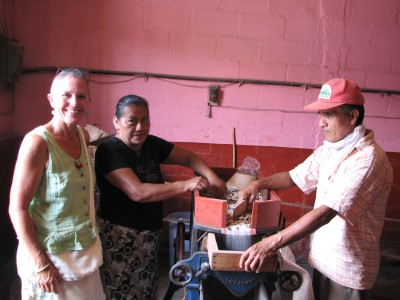
Tomorrow we will sail out of this manky, malodorous, sweltering, shithole Puerto Madera, turn left and within 20 miles be in Guatemalan waters, out of Mexico for the first time in five months. For me personally it will be like taking leave of an enigmatic but beautiful women for whom I have an irrational, adolescent crush but in truth I have no true capacity to know fully. So I have reveled in the simple and visceral delights she offers so readily.
You will read some terrible things of Mexico; the drug problems, the crime, the poverty, the corruption and now to top it all the swine flu, all of which are cancers within, but do not define the people and to us have not been evident. Despite the sometimes overwhelming physical beauty and diversity of the land, flora and fauna the Mexico we will remember is etched in the faces and resonant in the voices of the people we have met or sometimes merely observed and who almost without exception have faced us with good humor, patience, pride of place and humility of self. I have never heard so much laughter from people working so hard; the fishermen, the women at the market stalls, the taxi drivers, the girl in the lavanderia, the barely-out-of-adolescence, machine gun toting navy inspectors, the hardware store owners, the waiters, the construction workers and farm laborers in the fields.
Realizing it is easy for me to say, we have observed almost no abject poverty. The markets in every town or village have a stunning array of fruits, vegetables and dry goods and are always packed. Eating with family is the prevalent pastime and is going on everywhere, from the commedores tables in the marketplace, to the street side taco stands, the front room restaurants and the endless beachside palapa restaurants. Housing is simple, even crude by U.S. standards, but in this climate it is effective and usually kept neatly with dirt patios swept and raked and pavements outside town house doors likewise.
This has confused some notions I thought I had clearly understood. At one time on the racetrack I employed up to 75 people almost all of whom were reluctant immigrants from Mexico who had left family and friends behind to make the then illegal trek north for work. From conversations with these lads I understood that they came to the U.S., to earn minimum wage, live in cramped dismal backstretch rooms, struggle with a foreign language and generally be treated as second class citizens because they could not afford to put food on the table at home. That may have been the case, but if so we have not observed it in our five months here. Something more insidious is going on. We are all manipulated by the weight of corporate sales pressure and that pressure is all the more effective when it is applied to the uninitiated. I am coming to believe that the motivation for many that come north is no different than that which makes so many U.S. citizens over extend their credit in order to get a bigger flat screen, a flashier new car, larger refrigerator or more square footage. It is a yellow brick road, which in order to travel down everything dear, family, town and friends, has to be relinquished and yet at the end of which, behind the curtain, there is nothing.
There is a fast growing middle class here. It is apparent in the housing, the vacationers at the beach resorts, and the crowds shopping in the Home Depots, Walmarts and the like. Yet has hard as everyone seems to be trying the country succeeds only partially as a governing entity. So many great plans do not come to fruition, so many resources are wasted. If our time here has taught us anything it is to give thanks that we have lived in two countries, England and the U.S. where by chance, historical accident or design, the governing institutions, though not perfect, do a reasonable job of protecting their citizens and ensuring their chances of pursuing their unfettered dreams. It has not been so here, although perhaps it is changing for the better. An informe written in 1799 to the King of Spain by Antonio de San Miguel, The Bishop of Michoacan suggests these institutional fissures are developmental and deep rooted.:
" The population of New Spain is composed of three classes of people - white or Spanish, Indians and the castes or mixed. The Spaniards comprise one tenth of the total number, and nearly all the property and wealth is in their hands. The Indians and the castes cultivate the land , serve the wealthy, and live by manual labor. Because of this a conflict of interest results - a mutual hatred which is developing rapidly between those who have everything and those who have nothing ... There is no middle class; one is either rich or miserable, noble or infamous.
The benefits which the law seeks to give to the Indians are extremely limited, and it can almost be said that they do more harm than good ... The natives do not have individual property, and they are obliged to cultivate the holdings of the community. This method of cultivation comes to be an even more unbearable task for them because for many years in this area they have almost lost hope of receiving any profit from their labor...
The law prohibits intermarriage between castes; it prohibits the whites from living in the Indian towns; and it prohibits the Indians from living among the Spaniards. Civilization is opposed to this barrier which has been placed between them.
The castes are marked as inferior by law, and they are subjected to the tribute, which places on them an indelible blot. Among the mixed races there are many families which by color and stature could be confused with Spaniards, but the law scorns them. Although many are gifted and are people of good character, they are forced to live in a state of constant irritation against the whites; it is a wonder that their resentment does not move them to vengeance more often."
This type of institutional neglect causes a disconnect between the people and their political leaders, which in turn seems to instill a truer valuation of the local and the familial.
Goodbye Ode Pt. 2
05 May 2009 | Puerto Chiapas, MX
RC
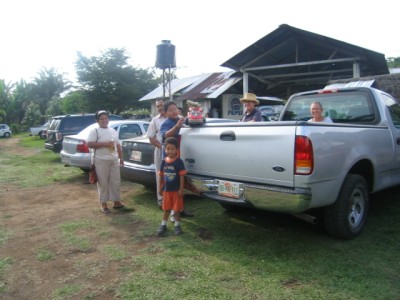
Forty miles inland from Puerto Madero, in the foothill shadows of Volcan Tacana, Tuxtla Chico, a charming modest little Chiapaqueno town is bustling on a Saturday morning market day, with wizened apple faced old ladies being peddled to and fro in tricycle taxis like regal old dowagers. This is the first Mexican town we have visited where gringos are so rare we are stared at by the children. We wander through the market down a street of five or six Mariachi "workshops", past a couple making chocolate in their house and into a residential area. A young women steps from a doorway and offers us coconut cakes which at first offering we decline and on the second we ask the price. No price she says, I have just cooked them and you are welcome. Whilst we dig into these we tell her how beautiful her town is and how we love the mountains around it. " Oh! We are going for a picnic in the mountains tomorrow. Would you like to come?" she says as if anything else would not have been normal.
So the next day we make our way back to Tuxtla Chico to spend a simple lovely day with the Cifuentes family, Rene, Dina and their two sons Luis and Rene Jr. For the ride up we share the back of the pick up truck with the two boys, which allows us to breath in the cooler fresh air of the mountains and take in steep vistas of coffee plants under their shade trees, mangos and other tropical fruit trees. Rene is proud to show us some of the local highlights; the Bavarian style house at the Santa Domingo coffee finca built by Eva Braun's brother in the early part of the 20th century (the saying goes that English pirates brought the coffee plants to this part of the world and then the Germans came to organize the production), the coffee plants, the fruit trees, the small mountain villages and cloud shrouded valleys. We finished with a carne asada feast along with fluffy hand made tortillas, the very best I have ever eaten, and back to the Cifuentes house for home canned peaches before giving our thanks and heading back to the harbor.
Our day with Rene and Dina, genuine, modest, generous and kind, serves as an emblematic coda for our whole experience of Mexico.
So the next day we make our way back to Tuxtla Chico to spend a simple lovely day with the Cifuentes family, Rene, Dina and their two sons Luis and Rene Jr. For the ride up we share the back of the pick up truck with the two boys, which allows us to breath in the cooler fresh air of the mountains and take in steep vistas of coffee plants under their shade trees, mangos and other tropical fruit trees. Rene is proud to show us some of the local highlights; the Bavarian style house at the Santa Domingo coffee finca built by Eva Braun's brother in the early part of the 20th century (the saying goes that English pirates brought the coffee plants to this part of the world and then the Germans came to organize the production), the coffee plants, the fruit trees, the small mountain villages and cloud shrouded valleys. We finished with a carne asada feast along with fluffy hand made tortillas, the very best I have ever eaten, and back to the Cifuentes house for home canned peaches before giving our thanks and heading back to the harbor.
Our day with Rene and Dina, genuine, modest, generous and kind, serves as an emblematic coda for our whole experience of Mexico.
Chiapas Mountains
05 May 2009 | Talquian, Chiapas, MX
Rc
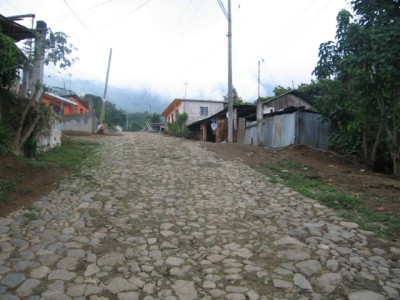
Cloud shrouded volcanoes
"It´s a hard rain gonna fall"
28 April 2009 | The Tehuantepec
VC
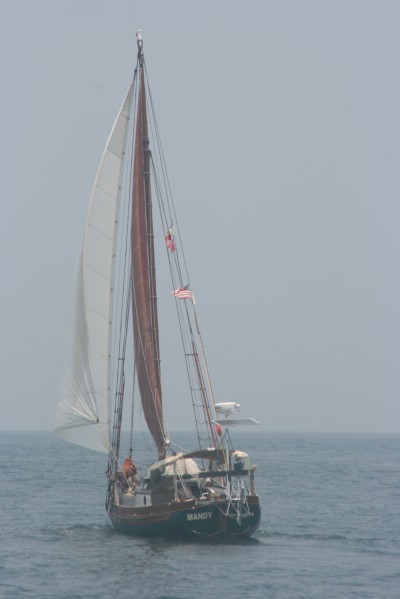
Horizontal fork lightening that tore the sky apart from one horizon, 180 degrees to the other. A smell of ozone so strong it made my adrenaline surge into every muscle of my body. Thunder that sent jolts from the deck up through my knee caps, combined with contrary gale force wind and unbelievably hard pelting rain that attacked us without impunity and made it virtually impossible to keep my eyes open. Fiction? Nope.
The radar showed that we were engulfed and in the exact center of a ten mile diameter storm cell that made its relentless path from the mountains of Chiapas out to the Gulf of Tehuantepec on the evening of Tuesday April 28th 2009.
The night before, the first of our four day passage across the infamous Tehuantepec, Richard had had to go up the mast at 0100 hrs to free a block that had become jammed at the very top of the jib halyard, due to an incorrect adjustment to the length of the tack. It was a new moon, so very dark as well as very wet on deck from heavy night dew. Going up the mast is something we both do fairly often for maintenance or varnishing, but not out at sea and never before at night. Thankfully the prevailing conditions that night were benign. The rolling of the boat was nevertheless vastly exaggerated at the top of the mast. Richard bruised some ribs as he swung repeatedly against the rigging and the stick and he was relieved not to have to stay up there longer than it took to release the block and be brought down again.
While waiting in Huatulco for our weather window to open up for the 250 mile crossing of the Gulf of Tehantepec, these two slightly traumatic events were not what we had expected in our list of challenges. What the Tehuantepec is most feared for is its capacity to carry even large cargo ships 400 miles out to sea with its shot gun northerly winds that blast through from the Gulf of Mexico to the Pacific. These winds originate as high pressure systems in Texas and gather speed and ferocity as they funnel through the 30 mile gap between the highlands of Oaxaca and Chiapas.
Our combined gribs and weather sources had promised us a week of helpful south to southwest winds at 10 knots and we set off from Huatulco, Oaxaca with high hopes for a calm passage "one foot on the beach" as all the experts advised. As it turned out, our winds enabled us to be a comfortable1-3 miles off most of the way. Our gribs had also shown us some storm activity for Tuesday afternoon but it was all over the land and when we heard thunder rumbling we smiled knowingly at the precision of our forecasting information. We made no moves to ready ourselves for the mayhem that was on our doorstep. Big mistake!
Neither of us has experienced or been out in such violent weather. It was simultaneously awesome and deeply terrifying. We are expecting a good deal of lightening and thunder as we pass into Central America for the summer (rainy season) and Richard had already half finished a system for lightening control, but it was not in functioning mode for this storm.
We ate dinner and shared a glass of wine while watching the clouds gather in the distance and listening to the strengthening thunder claps, but when the wind began to build suddenly, everything was tossed into the sink. We got the jib doused and the main double reefed in less than five minutes. After that all hell seriously broke loose. We hand steered through the worst of it, our safety harnesses attached by their lifelines to the boat. Once the wind fixed itself in one direction, we were able to set the auto pilot and go below to shelter, while unbelievable lightening, rain and thunder had its way outside. Why we weren't struck, our hull blown out and all our instruments fried, I will never know. This was no squall; it took us an hour and a half going five knots under a double reefed main to get out of the maelstrom.
Mandy was warm and dry down below and the din of the storm was muted through her overbuilt sides. We brought down several inches of rain with us which drained into the bilges but we were amazed at how protected we felt once below.
I have never really minded danger and chance. Driving fast, skiing black diamond runs, riding kooky racehorses, living in Southern California with its fire storms and earthquakes and now blue water sailing, because with danger comes a heightened sense of being truly alive and present in one's body. These recent incidences have reinforced that view. A quiet unchallenging life may seem appealing, but balancing one with the other makes us complete and keeps things interesting to boot.
Once we reached the other side of the Gulf of Tehuantepec at Puerto Madero, it was dark and we were forced to wait out the night off shore until dawn. We made it into the protected, if stinky anchorage (there is a fish meal plant nearby) and we met up with our friends David and Suzi on Sidewinder. Lots of storm rehashing and camaraderie ensued. Once we all get some R & R and they complete some repair work, we will set off again for the next 250 mile leg to Bahia del Sol in El Salvador. There is a difficult bar to cross to enter the bay, but that will be fodder for another day.
The radar showed that we were engulfed and in the exact center of a ten mile diameter storm cell that made its relentless path from the mountains of Chiapas out to the Gulf of Tehuantepec on the evening of Tuesday April 28th 2009.
The night before, the first of our four day passage across the infamous Tehuantepec, Richard had had to go up the mast at 0100 hrs to free a block that had become jammed at the very top of the jib halyard, due to an incorrect adjustment to the length of the tack. It was a new moon, so very dark as well as very wet on deck from heavy night dew. Going up the mast is something we both do fairly often for maintenance or varnishing, but not out at sea and never before at night. Thankfully the prevailing conditions that night were benign. The rolling of the boat was nevertheless vastly exaggerated at the top of the mast. Richard bruised some ribs as he swung repeatedly against the rigging and the stick and he was relieved not to have to stay up there longer than it took to release the block and be brought down again.
While waiting in Huatulco for our weather window to open up for the 250 mile crossing of the Gulf of Tehantepec, these two slightly traumatic events were not what we had expected in our list of challenges. What the Tehuantepec is most feared for is its capacity to carry even large cargo ships 400 miles out to sea with its shot gun northerly winds that blast through from the Gulf of Mexico to the Pacific. These winds originate as high pressure systems in Texas and gather speed and ferocity as they funnel through the 30 mile gap between the highlands of Oaxaca and Chiapas.
Our combined gribs and weather sources had promised us a week of helpful south to southwest winds at 10 knots and we set off from Huatulco, Oaxaca with high hopes for a calm passage "one foot on the beach" as all the experts advised. As it turned out, our winds enabled us to be a comfortable1-3 miles off most of the way. Our gribs had also shown us some storm activity for Tuesday afternoon but it was all over the land and when we heard thunder rumbling we smiled knowingly at the precision of our forecasting information. We made no moves to ready ourselves for the mayhem that was on our doorstep. Big mistake!
Neither of us has experienced or been out in such violent weather. It was simultaneously awesome and deeply terrifying. We are expecting a good deal of lightening and thunder as we pass into Central America for the summer (rainy season) and Richard had already half finished a system for lightening control, but it was not in functioning mode for this storm.
We ate dinner and shared a glass of wine while watching the clouds gather in the distance and listening to the strengthening thunder claps, but when the wind began to build suddenly, everything was tossed into the sink. We got the jib doused and the main double reefed in less than five minutes. After that all hell seriously broke loose. We hand steered through the worst of it, our safety harnesses attached by their lifelines to the boat. Once the wind fixed itself in one direction, we were able to set the auto pilot and go below to shelter, while unbelievable lightening, rain and thunder had its way outside. Why we weren't struck, our hull blown out and all our instruments fried, I will never know. This was no squall; it took us an hour and a half going five knots under a double reefed main to get out of the maelstrom.
Mandy was warm and dry down below and the din of the storm was muted through her overbuilt sides. We brought down several inches of rain with us which drained into the bilges but we were amazed at how protected we felt once below.
I have never really minded danger and chance. Driving fast, skiing black diamond runs, riding kooky racehorses, living in Southern California with its fire storms and earthquakes and now blue water sailing, because with danger comes a heightened sense of being truly alive and present in one's body. These recent incidences have reinforced that view. A quiet unchallenging life may seem appealing, but balancing one with the other makes us complete and keeps things interesting to boot.
Once we reached the other side of the Gulf of Tehuantepec at Puerto Madero, it was dark and we were forced to wait out the night off shore until dawn. We made it into the protected, if stinky anchorage (there is a fish meal plant nearby) and we met up with our friends David and Suzi on Sidewinder. Lots of storm rehashing and camaraderie ensued. Once we all get some R & R and they complete some repair work, we will set off again for the next 250 mile leg to Bahia del Sol in El Salvador. There is a difficult bar to cross to enter the bay, but that will be fodder for another day.
And down to Huatulco
20 April 2009 | Bahia Santa Cruz
RC
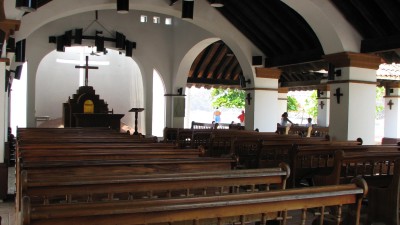
Here in the sheltered bay of Huatulco, we will wait for the gale that is blowing in the Tehuantapec to subside and then head to Puerto Madero in Chiapas, our last stop in Mexico.
This beautifully designed open sided church is right on the beach beside the ramada restaurants.
This beautifully designed open sided church is right on the beach beside the ramada restaurants.
Puerto Angel to Bahia Manglillo
17 April 2009 | Manglillo
RC
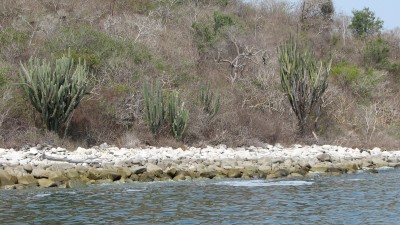
Alone in the bay for three days with only indigenous yarn dyers camped on the beach harvesting sea snails for the purple dye
| Vessel Name: | Mandy |
| Vessel Make/Model: | Bristol Channel Cutter 28 - http://www.capegeorgecutters.com/BCC28/index.html |
| Hailing Port: | San Diego, CA USA |
| Crew: | Richard & Virginia Cross |
| About: |
Gallery not available
There Goes Mandy!
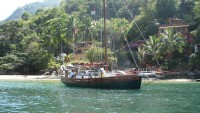
Who: Richard & Virginia Cross
Port: San Diego, CA USA
Also look here:
- Gallery of Mandy - pre Nov. '08
- Gallery of side trips
- Gallery of Mandy Minor
- Videos
- Log Recap
- Gallery of Galicia
- Top man in Galicia - Mark Adkinson
- BCC Owners Forum
- Cruising World Magazine
- Living Aboard Magazine
- Ben Eriksen's BCC
- Dave & Kathy - Lightspeed
- Great Recipes
- Heart Hustle Collective
- Jan & Yolanda Palmboom
- Or The Whale - Fav.Music
- Shoal Bay Lodge - Vancouver Island

